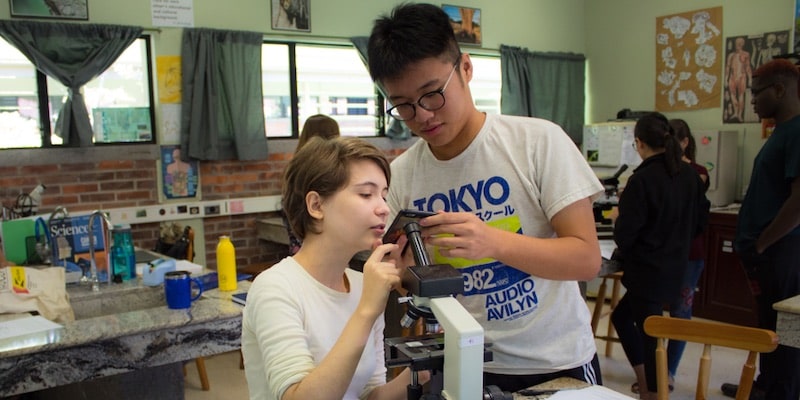We explain what discovery learning is, what its principles are and how it can be implemented. Also, its advantages and the role of the teacher.

What is discovery learning?
Discovery learning is a teaching methodology through which students construct their knowledge by themselves, based on interaction with the contents and with other people. It differs from traditional teaching, in which a teacher transmits information so that students receive it.
Learning is a complex process that can be analyzed from various perspectives. This allows the existence of different learning theories, that is, explanations and descriptions of how learning is done and, consequently, different teaching methods.
Discovery learning implies an active role in knowledge. It is based on direct experience and real contextual situations. Instead of assuming a passive position, the individual must investigate, develop his skills and solve problems, so he learns as he “discovers.” The student is thus the main protagonist of the teaching-learning process.
This method is based on the principles of cognitive-constructivist psychology, especially the theories on learning of the American psychologist and pedagogue Jerome Seymour Bruner (1915-2016), which question repetitive and mechanical learning. According to this approach, The role of the teacher is to provide appropriate materials and stimulate exploration and curiosity.
Key points
- Discovery learning is a teaching methodology that encourages students to acquire knowledge on their own.
- The student has a leading role in their learning process, which occurs through interaction with objects and experimentation.
- The teacher acts as a facilitator or guide: he provides relevant information and resources and motivates interest.
- Its main advantages are the development of autonomous thinking and a more lasting understanding of the concepts acquired.
- See also: Constructivism
Principles of discovery learning
Discovery learning is a fundamentally active and inductive method, whose fundamental principles are:
- Knowledge is a construction that allows the subject to understand reality. It is constituted directly by the student through research, experimentation and confrontation with reality.
- It is necessary to promote the development of skills and strategies that make it possible to “learn to learn”, that is, recognize the learning process itself and improve its effectiveness.
- The teacher is a guide or facilitator who accompanies the learning process.
- Learning is acquired inductively, from specific observations or data that lead to general conclusions.
- The process should encourage critical thinking and creativity. Each person organizes information from their own point of view.
How to implement discovery learning?
Discovery learning is possible from immersion in problematic situations. Interaction with reality allows us to classify, associate, organize concepts and construct meanings.
The application of discovery learning in the classroom involves rethinking everyday tasks and activities, so as to replace the idea of oral transmission of knowledge with that of participatory teaching. This involves, for example, the design of workshops and projects in which students must get involved to obtain different results, opening the space for debate and drawing conclusions.
In the design of these activities, the student must play a leading role, that is, they must be motivated and involved. Learning must welcome curiosity and experimentation, so that knowledge is not an abstract entity disconnected from life experience. In addition, it is necessary to provide opportunities to interact with objects: manipulate them, transform them and analyze them.
The role of the teacher in discovery learning
Contrary to mechanistic learning models, in which the teacher is the transmitter of knowledge and the students are recipients of knowledge, discovery learning states that the educator must be a guide and facilitator of the learning experience. Their role is to motivate students' interest and offer resources without imposing answers.
In this sense, the role of the teacher in discovery learning is to design strategies and challenges according to the interests and motivations of students. In addition, you must create a conducive environment for them to experiment and investigate.
It is a dynamic, learner-centered role. It also involves reflecting on the task itself and making adjustments to the strategies or approach, depending on the results that are observed.
Advantages of discovery learning
Discovery learning aims to overcome the limitations of reproductive or mechanistic methodologies. Its main advantages are:
- Promotes the formation of one's own and original thinking, and individual reflection on the learning process.
- It stimulates creativity and the search for solutions to the problems faced.
- It reinforces the student's self-esteem and self-confidence, by making them participate in the learning process.
- It links teaching with very basic human motivations, such as curiosity, problem solving and fascination with the unknown.
- It opens spaces for student participation, which favors the memorization of learning.
- It facilitates the application of knowledge to new situations, since it relates theory to practice.
document.addEventListener(“DOMContentLoaded”, (e) => {
var sliderContainer, slider;
sliderContainer = document.getElementById(‘block_aa19bde4858089acd04e123a7efc16ac’);
if (typeof initSlider !== ‘function’) {
console.log(‘Swiper haven\’t been loaded’);
sliderContainer.className += ‘ fw scroll-snap’;
return;
};
options = {
direction: ‘horizontal’,
speed: 1000,
slidesPerView: ‘auto’,
// slidesPerGroup: 1,
centerInsufficientSlides: true,
// centeredSlides:true,
spaceBetween: 15,
breakpoints: {
720: {
// centeredSlides: false,
// slidesPerGroup: 2,
spaceBetween: 25
},
},
pagination: {
el: ‘.swiper-pagination’,
type: ‘bullets’,
clickable: true
},
}
slider = initSlider(sliderContainer, options);
})
References
- Barrón Ruiz, A. (1993). Discovery learning: principles and inappropriate applications. Science Teaching. Magazine of research and teaching experiences11(1), 3-11. https://ensciencias.uab.cat
- Espinoza-Freire, E.E. (2022). Discovery learning vs traditional learning. Transdisciplinary Journal of Social and Technological Studies2(1), 73-81. https://revista.excedinter.com
- Sulle, A and Zerba, D. (Comps.). (2019). The epistemic plot of psychology. FEDUN.





